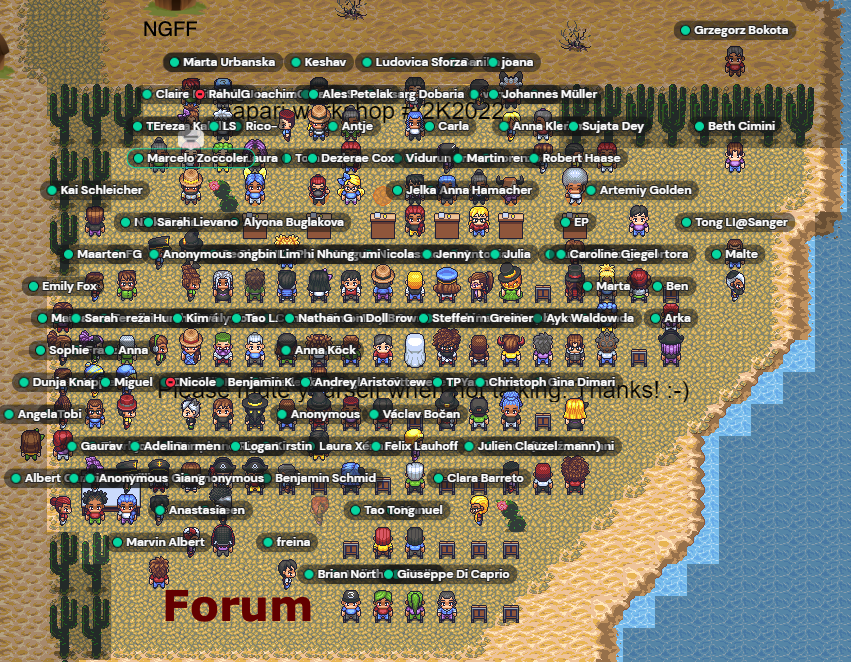This is a joint effort by the napari community. Napari is a tool gaining more and more attention in the bio-image analysis community. Beyond giving a general introduction to napari and its plugin ecosystem, we would like to demonstrate its current capabilities and some plugins we are working on and with.
The workshop will take place 7 am CT (2 pm CEST) in the Forum south-east on the image.sc gather town island
-
Introduction to napari (15 min, Lorenzo Gaifas)
-
Using napari from Jupyter notebooks (15 min, Marcelo Zoccoler)

-
Accelerated pixel and object classification (15 min, Robert Haase)

-
Labeling with overlapping labels (15 minutes, Tom Burke)
- Plugin presentation for overlapping labels and labelset creation
- I/O in a transferable format compatible with ImgLib2/Fiji
- Outlook to use-cases and possible workflows
-
Restoration and Measurement (20 minutes, Brian Northan)

- Atendees should be comfortable programming short Python code segments in IPython Notebook
- Briefly introduce Deconvolution and Background Subtraction
- Talk about important of Point Spread Function, how to compute it.
- Deconvolve and/or apply background subtration to real images.
- Perform segmentation, watershed and then morphological and intensity measurements
- Show how Restoration can improve downstream measurements. Show how to explore input images and processed images using Napari and Matplotlib.
-
Different use cases for segmentation in VollSeg Napari plugin (20 min, Varun Kapoor)


- Demo links: Video1 Video2
- A short intro to VollSeg Napari plugin and presnet use case for Light sheet imaged fused Ascadian embryo.
- Present a second use case on TZYX dataset of breast carcinoma cells.
- Show the UX features like cancelling jobs running in background threads, displaying results of interest and other options to choose from.
- Presnet a third use case of sparse but concentrated 3D nuclei with large background pixels.
- Show the availability of training, test datasets and trained models with colab notebooks and accuracy metric evaluation for the presented use cases and more: here.
-
3D interactivity in napari (15 mins, Alister Burt, Kevin Yamauchi)

- (5 mins) introduction and motivation behind 3D interactivity, show 3D interactivity docs
- Large 3D datasets (fluorescence, EM), multiple existing solutions for vis
- Annotation in 3D is non-trivial but essential for analysis (e.g. deep learning)
- Also, exploring 3D data along axis not aligned with the data axes is difficult
- implementing custom modes of interacting with data in 3D currently requires development of an entire application
- (10 mins) introduce napari-threedee, demo and wrap up
- Use case 1: using built-in widget plugins to interact with your data
- Use case 2: using the manipulators/annotators in your own application
- (5 mins) introduction and motivation behind 3D interactivity, show 3D interactivity docs
-
How to make Napari plugins + testing (Draga Doncila Pop)
We would like to ask attendees of the workshop to setup conda on their computers before the session. If you have never used conda before, please read this guide first.
Afterwards, please create a couple of environments
conda create --name basic-napari python=3.9
conda activate basic-napari
conda install -c conda-forge napari jupyterlab
conda create --name devbio-napari python=3.9 devbio-napari -c conda-forge
conda activate devbio-napari
Mac-users please also install this:
conda install -c conda-forge ocl_icd_wrapper_apple
Linux users please also install this:
conda install -c conda-forge ocl-icd-system
Deconvolution napari is an extension of developmental biology napari but requires the jupyter notebook extension and a couple of experimental libraries.
We could just add these to devbio-napari but it's good practice to install experimental libraries in a new environment.
conda create --name decon-napari python=3.9
conda activate decon-napari
conda install -c conda-forge jupyterlab
conda install -c conda-forge pyopencl==2021.2.6 hdbscan numba=0.55.1
pip install devbio-napari
conda install -c conda-forge fftw
pip install napari-sdeconv
pip install git+https://github.com/True-North-Intelligent-Algorithms/tnia-python
pip install --index-url https://test.pypi.org/simple/ --no-deps clij2-fft
pip install stardist
Mac-users please also install this:
conda install -c conda-forge ocl_icd_wrapper_apple
Linux users please also install this:
conda install -c conda-forge ocl-icd-system
The materials in this repository are licensed CC-BY 4.0 by the contributors unless mentioned otherwise.
